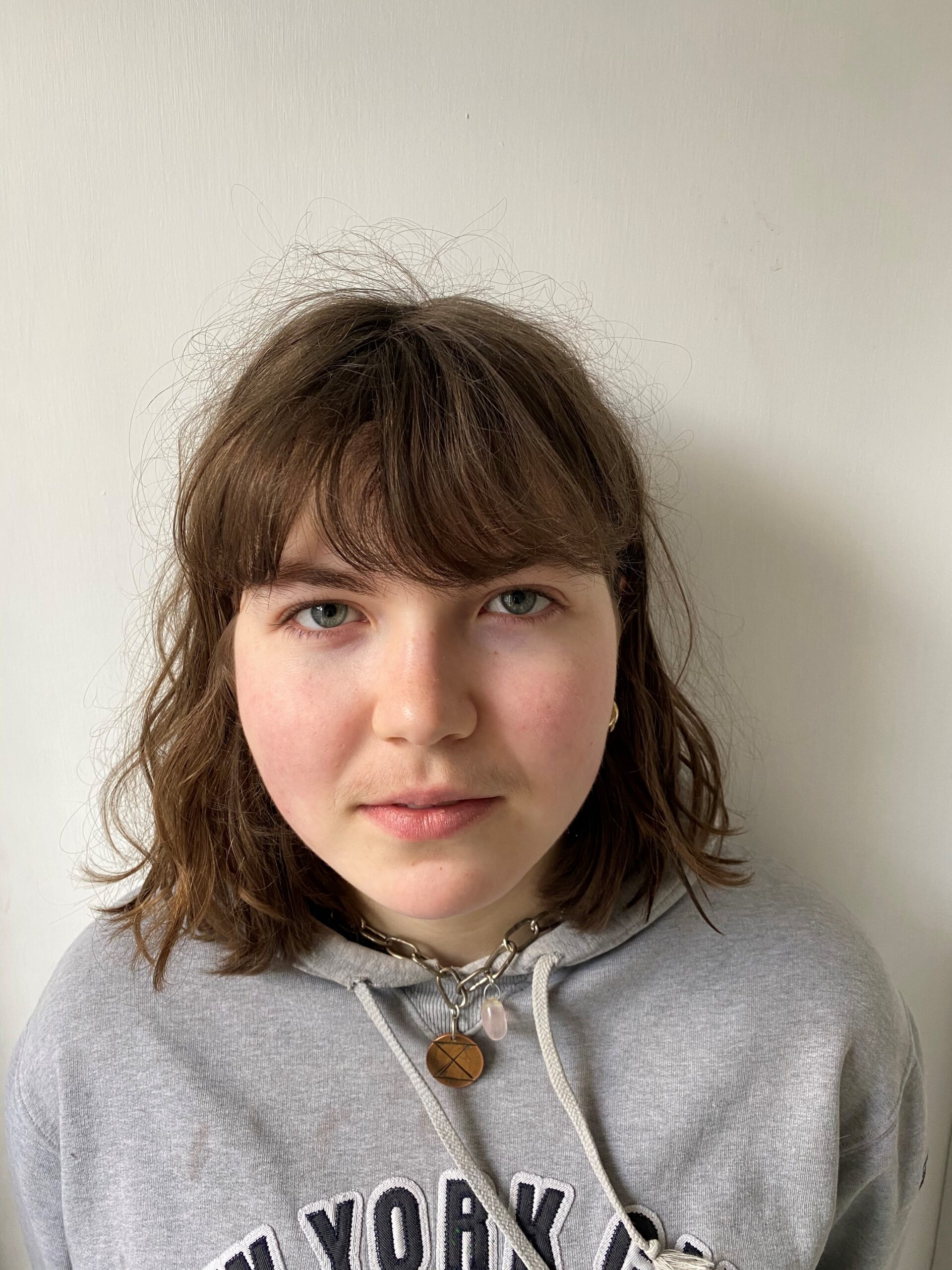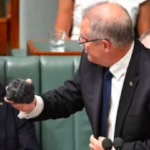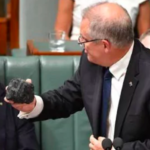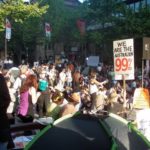Challenge Everything: An Interview With Extinction Rebellion’s Blue Sandford

The Extinction Rebellion (XR) has again mobilised across London. This time ten days of action culminated on Thursday with 13 topless women locking on outside Westminster Palace, drawing attention to the dangers faced if temperatures rise by 4°C above pre-industrial levels.
Conservatives politicians have criticised the actions of the activists. PM Boris Johnson condemned protesters last Friday for blocking two printworks responsible for a number of News Corp papers, as part of a campaign calling on the Murdoch press to tell the truth about climate.
It was April last year that really saw XR really hit the global stage, when activists shut down parts of London for over a week, demanding that governments tell the truth about the climate emergency, take immediate action on it, and establish citizens’ assemblies to help guide it.
And the rebellion has since spread across the globe since.On 4 September, Extinction Rebellion Sydney staged a similar News Corp focused action, when local rebels arranged for a pile of bullshit to be dropped at the front door of the media giant’s Sydney offices.
London youth
“Extinction Rebellion is an international apolitical movement that uses nonviolent direct action and civil disobedience to persuade governments to act on the climate and ecological emergency,” writes Blue Sandford in Challenge Everything: An Extinction Rebellion Youth Guide to Saving the Planet.
The 17-year-old Extinction Rebellion Youth London activist has just published her first book, which is a manifesto designed to empower young protesters. It’s a comprehensive guide tackling a range of issues from nonviolent direct action to talking to climate deniers to ecofriendly eating.
Sandford joined Extinction Rebellion in 2018. And she turned 17 in a police lockup last October, after she’d been arrested for taking part in an action that involved obstructing a highway. Blue wasn’t too impressed about the treatment she received at the hands of police officers either.
And in putting it all on the line to save the Earth, Sandford went on permanent school strike in June last year, as she wants to take steps to ensure there’s an environment to support her in the coming decades, before she deals with looking towards any career that schooling can secure.
The virus hasn’t halted the change
Blue’s book has hit the shelves at a time when much of the global mobilising around the climate and ecological crisis has taken a backseat, as populations have been locked down to prevent the spread of COVID-19.
But as Sandford points out, the coronavirus is one of a rising number of diseases being transmitted from animals to humans, which is yet another symptom of the growing climate emergency the planet is facing.
Sydney Criminal Lawyers spoke to Blue Sandford about whether the COVID shutdown has curbed changing climate, the reasons she’s involved in the XR movement, and why it’s essential for the future that people begin challenging everything.

Firstly, a lot of people who aren’t so scientifically minded are wondering whether the pandemic has led to an improvement in regard to the climate crisis. While others seem to have put their concerns about climate on the backburner.
Blue, do we still need to be concerned about the environment?
I’ve been hearing this a lot – look, there are dolphins in the canal. We’ve solved global warming. But it’s not true.
For example, Earth Overshoot Day is the day each year when it’s estimated we’ve consumed all the resources that the Earth can reproduce that year. It’s been happening earlier and earlier each year as we use up unsustainable resources.
And COVID did manage to push it back – but just by three weeks to the 22nd August.
Some of the most eminent climate scientists talk in terms of billions of deaths on the current trajectory. Those deaths aren’t unknown strangers in faraway places – they could be you and me.
To prevent this, every year from now on until they reach zero, emissions have to fall by about the same as they’ve fallen because of COVID.
So, the COVID decline is just this year—we will still need a similar decline every year to make people safe.
The pandemic is part of the climate and ecological emergency (CEE) – it’s come from eating meat and flying around everywhere.
We’ve got to address the CEE if we want to stop future pandemics. And addressing the CEE is going to need a lot more than a few months of driving a bit less. The environment needs to be our priority.
So, we’re speaking today because you’ve just released your new book Challenge Everything: An Extinction Rebellion Youth Guide to Saving the Planet.
Without giving it all away, what do you outline in the book?
The book is basically all the things that I’m trying to do to cut down on my own footprint. I sat down and brainstormed the changes that have the biggest impact, and stuff that I was thinking about, like community and consumption, and finding new ways to interact and live.
It’s a place to start—governments have to act but we don’t have to wait for them to reduce our own complicity in the pain that’s being caused.
Once you start acting you can see climate crime more clearly for what is, and you will inspire others.
And hopefully enough people will make it mainstream and normal that social proof will start to come into effect.
And given that, why would you say young people need some guidance in these matters at this point in time?
There’s a lot of greenwashing and propaganda, especially in the media, so it’s hard to figure out what’s true and what you actually need to do to stop the CEE.
With my book, I wanted to give a jumping off point to say here are the things you should be looking at and here are the tools to find out more about them and actually make a change.
It’s just a start, to get people thinking and talking about the huge changes we are all going to have to make – and not just thinking and talking but following through and making them.
We all have to figure out how to decarbonise our lives – down to zero, really fast – and it can be hard to figure out how to do that.
You’re a key player in Extinction Rebellion Youth London. Often XR gets a bad rap from conservative sectors. However, the group has achieved a lot in a short period.
Why do you choose to be part of the Extinction Rebellion? And what’s it all about?
I’m a part of XR because it’s the most effective way for me to create change right now. As you said, it has achieved so much, and we’re at the point where we need to do everything that we can.
XR is using nonviolent direct action as a way to draw attention to the climate crisis, and it’s working. Instead of calling things out, we have to act—the time for talking is over.
At 17 years of age, you’re one of the most notable youth climate activists around. So, what do you get up to in terms of organising and mobilising?
I’m actually a really bad organiser. When I first joined XR, I became the XR Youth arts coordinator for London, and I found it really difficult and draining.
I’d put so much energy in and not really accomplish anything or it would all fall apart at the last moment.
Since then, I’ve experimented with a lot of different roles and come to the conclusion that organising and coordinating is not for me.
Instead, I’ve been writing my book to try to reach people in another way. And at the moment, I’m living in a camp in Denham trying to protect ancient woodlands, in which I played as a child, from being destroyed by HS2 (a proposed highspeed railway).
It’s the most beautiful place imaginable. We used to swim in the river by the golf course and collect lost golf balls.
We ended up with hundreds of them and didn’t know what to do with them. Perhaps that’s a metaphor for consumerism.
The book’s main title is Challenge Everything. Can you expand a little on what you mean by that?
We aren’t being told the truth – schools aren’t teaching facts, and unfortunately, we can’t trust mass media to tell us the truth.
There’s so much propaganda and lying that we have to question everything we’re told. It’s like in films like the Truman Show or the Matrix or the Game—nothing is as it seems.
So, we have to challenge the lies we are being sold and begin to live in a way which isn’t killing other people – or even ourselves.
And the way to do that is to challenge all your assumptions, your habits, your vices. It’s really about consuming things which are not harmful and finding out about and avoiding things like cruises and flights and driving, which are.
And lastly, Blue, at the beginning of the year it felt like a greater number of people started to take the climate emergency seriously. But the pandemic and the responses to it seem to have pushed that back.
In your opinion, just how drastic a situation are humans in at present? And how dire is the need to act?
The virus is just a special case of the general emergency we’re facing. It is tragic, but not nearly as tragic as the climate and biodiversity emergencies.
The scientific consensus is completely clear – if we don’t change now, we might not survive. Already thousands of people, animals and plants, and whole species are being killed every day. Killed is forever.
The pandemic is a part of the CEE—the displacement of zoonoses into the human population by disrupting wild reservoirs—and it’s only going to get worse if we fail to address the real causes, shut down destructive industries and change our behaviours.
Politicians are starting to declare climate emergencies, but they still aren’t acting in a way which will stop them.
Instead they carry on with projects that will advance ecocide like the UK’s second highspeed railway, HS2, set to be the most environmentally destructive project in UK history.
Or funding gas fields in Mozambique. It’s outrageous and it has to stop. We have to stop them and build a future to live for.
At the moment people aren’t listening, and the responsibility is falling on scientists, activists, frontline communities and young people like me, but we need a lot more people to understand what’s happening if we’re going to solve anything.
We can do it, but not by being passive. We have to act, and Extinction Rebellion is a pretty good start.
Challenge Everything can be purchased online, or it’s available at all good bookstores.







